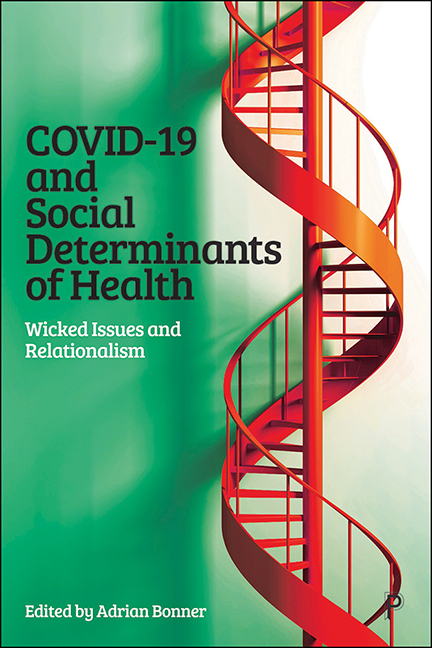Book contents
- Frontmatter
- Miscellaneous Frontmatter
- Contents
- List of figures and tables
- Notes on contributors
- Foreword
- Introduction
- Part I Wicked issues and relationalism
- Part II Regionalism and geopolitical environments
- Part III Public sector, COVID-19 and culture change
- Part IV The third sector
- Part V The case for relationalism
- Part VI Engagement and proposed changes
- Conclusion
- Appendix The Centre for Partnering
- Index
21 - When the politically impossible becomes the politically inevitable: has the moment arrived for the wholesale adoption of relationism?
Published online by Cambridge University Press: 18 January 2024
- Frontmatter
- Miscellaneous Frontmatter
- Contents
- List of figures and tables
- Notes on contributors
- Foreword
- Introduction
- Part I Wicked issues and relationalism
- Part II Regionalism and geopolitical environments
- Part III Public sector, COVID-19 and culture change
- Part IV The third sector
- Part V The case for relationalism
- Part VI Engagement and proposed changes
- Conclusion
- Appendix The Centre for Partnering
- Index
Summary
Introduction
What is relationism? In its broadest sense, it can be understood as the assumption that positive relationships will lead to positive outcomes. Enhancing the quality of relationships between people and organisations is increasingly favoured as a way to improve the delivery of public services and thus social outcomes. Yet much of the institutional machinery built by industrialised societies in the modern era has focused on ensuring that individuals cannot cosy up with each other to take advantage of others (think of arm’s-length legal principles or procurement rules, for example). Still, it seems unlikely that a move towards relationism is inspired by a sense that modern standards of probity have gone too far. More likely, those serving the public are striving to find new types of relationship that avoid past dangers while unlocking some of the benefits that positive relationships must surely bring.
What might these new types of relationship look like? And is there evidence that that they will lead to better outcomes? And if these new types of relationship are to have a future in delivering services to the public and improving social outcomes, what might enable their widespread adoption – an electorally endorsed wholesale reform, or continued experimental, incremental adjustments?
This chapter will attempt to describe some of the emerging relational tools that leaders and practitioners working in different sectors have made use of, before examining how widespread these practices might become.
Unpacking relationism
What sort of tools and practices count as ‘relational’? What many of the examples seem to have in common is a focus on maintaining and enhancing the quality of personal and organisational relationships, by increasing the pro-social behaviour of people who work together in a place, policy domain or system. This pro-social environment might be characterised by certain attitudes, for example:
• Inclination to trust. People might assume that associates have an intrinsic motivation to do a good job, which counterbalances extrinsic motivators related to personal gain. This might lead them to trust in others to do the right thing, rather than treat them with scepticism or suspicion.
• Concern for long-term reputation. People might understand that reputational incentives act as a motivator, leading to a long-term and widespread desire not to look bad to one’s peers.
- Type
- Chapter
- Information
- COVID-19 and Social Determinants of HealthWicked Issues and Relationalism, pp. 376 - 391Publisher: Bristol University PressPrint publication year: 2023



